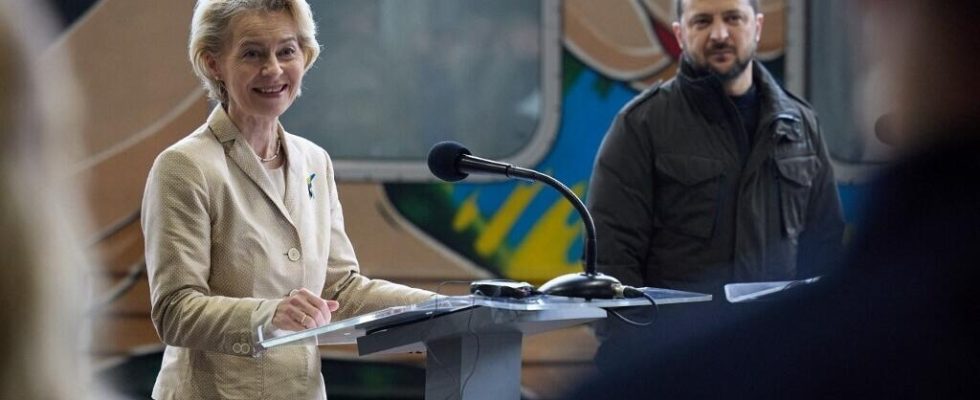While the situation remains extremely tense on the front line, the European Commission recommended, on Wednesday November 8, the opening of negotiations for accession to the European Union with Ukraine, as well as with Moldova. An announcement eagerly awaited by Ukraine and welcomed by President Volodymyr Zelensky.
3 mins
This recommendation made by the European Commission is more than welcome at a time when Ukraine, in addition to resisting a external aggression which is bringing the country down economically and demographically, has begun a colossal and rapid reform project, with a view to joining the European Union.
In response to this recommendation, President Zelensky recalled that the history of Ukraine, and of all of Europe, was taking the right path, seen from kyiv. He greeted a “ not historical » between the European Union (EU) and Ukraine.
I welcome today’s recommendation by the European Commission to open EU accession negotiations with Ukraine.
This is a strong and historic step that pave the way to a stronger EU with Ukraine as its member.
I thank the EU and personally @vonderleyen for supporting Ukraine on… pic.twitter.com/7py1imxCRT
— Volodymyr Zelenskyy / Володимир Зеленський (@ZelenskyyUa) November 8, 2023
Ruslan Stefanchuk, the speaker of the Ukrainian Parliament, spoke of a long-awaited recognition of Ukraine’s progress towards EU accession. He recalled that the evaluation of the progress made was carried out on objective criteria, which is very important seen from Kiev given the immeasurable price paid by the Ukrainians simply for wanting to get closer to Europe. Ukrainians are therefore keen that their efforts are recognized on these objective criteria, specifies our correspondent in kyiv, Emmanuelle Chaze.
So for the negotiations to begin, there are seven conditions that Ukraine has been working on. Of these seven conditions, four of the necessary criteria have already been met. They concern legislative reforms, the legal system, the country’s media and the fight against money laundering. Three other conditions still need to be met: the fight against corruption, the neutralization of oligarchic structures, and finally, the protection of minorities in the country.
For Ukraine, this is recognition of their statehood
So, what does this recommendation actually change for Ukraine? For Alexandra Goujon, lecturer at the University of Burgundy and specialist in Ukraine, we cannot know exactly what the repercussions will be in the conflict itself:
“ On the other hand, we know that the conflict is linked to Russia’s desire to dominate Ukraine.explains the lecturer. The opening of negotiations is a new step which shows that the European Union is committed to the independence of Ukraine and to the Ukrainian state. So for the Ukrainians, it is not just another step in European integration – that is one thing – but it is a recognition of their State and the viability of their State in the long term, a viability which is being called into question today by Russia. »
According to Alexandra Goujon, this will give a kind of breath. The fight that began in 2014 with the Maidan revolution has come to fruition, “ that is to say that we are not only in the association agreement, we are moving towards integration “.
Now, the leaders of the 27 will in turn give their opinion in mid-December. And it will be the start of several years of negotiations.
Read alsoRussia-Ukraine: “The question today is who uses and who fixes the strengths of the other”
